英语作文网络道德
如何遵守网络道德与规范作文

如何遵守网络道德与规范作文In today's digital age, it is important for individuals to adhere to ethical and moral standards when using the internet. Network ethics and norms are a set of guidelines that govern online behavior and interactions. These guidelines are essential in promoting a safe, respectful, and positive online environment for all users.在当今数字时代,个人在使用互联网时遵守道德和伦理标准至关重要。
网络道德与规范是一套指导在线行为和互动的准则。
这些准则对于促进一个安全、尊重和积极的在线环境对于所有用户都至关重要。
First and foremost, individuals should practice integrity and honesty when using the internet. This means refraining from spreading false information, plagiarizing content, or engaging in deceptive practices. Being truthful and transparent in one's online activities promotes trust and credibility within the online community.首先,个人在使用互联网时应当实践诚实和正直。
这意味着不传播虚假信息,不剽窃内容,或者参与欺骗性的行为。
网络文明礼仪英语作文
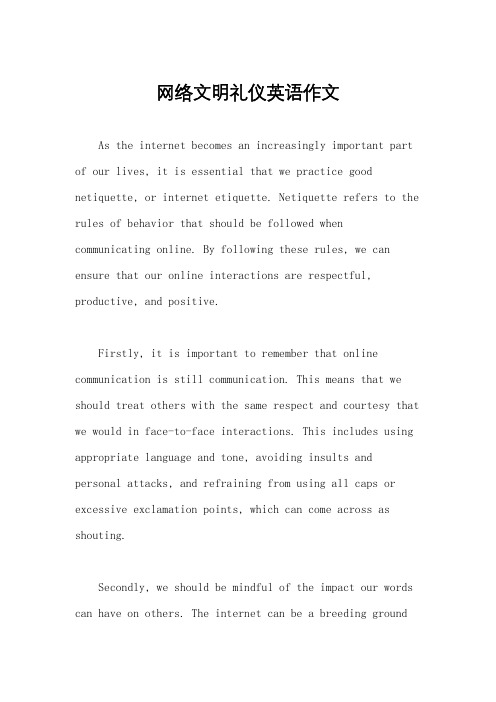
网络文明礼仪英语作文As the internet becomes an increasingly important part of our lives, it is essential that we practice good netiquette, or internet etiquette. Netiquette refers to the rules of behavior that should be followed when communicating online. By following these rules, we can ensure that our online interactions are respectful, productive, and positive.Firstly, it is important to remember that online communication is still communication. This means that we should treat others with the same respect and courtesy that we would in face-to-face interactions. This includes using appropriate language and tone, avoiding insults and personal attacks, and refraining from using all caps or excessive exclamation points, which can come across as shouting.Secondly, we should be mindful of the impact our words can have on others. The internet can be a breeding groundfor negativity and hostility, but it doesn't have to be. By choosing our words carefully and avoiding inflammatory language, we can create a more positive online environment. We should also be aware of the power dynamics that canexist online, and avoid using our words to bully or intimidate others.Thirdly, we should respect the privacy and personal information of others. This means not sharing personal information without permission, not forwarding private messages or emails, and not posting photos or videos of others without their consent. It also means being aware of the risks of online scams and phishing attempts, and taking steps to protect our own personal information.Fourthly, we should be mindful of the impact our online actions can have on our offline lives. This includes being careful about what we post online, as well as being aware of the potential consequences of our online behavior. We should also be mindful of the fact that our online behavior can reflect on our offline reputation and relationships.Finally, we should be responsible and accountable for our online behavior. This means taking responsibility for our words and actions, and apologizing when we make mistakes. It also means reporting inappropriate behavior to the appropriate authorities or moderators, and taking steps to prevent similar incidents from happening in the future.In conclusion, practicing good netiquette is essential for creating a positive and respectful online environment. By following these guidelines, we can ensure that our online interactions are productive, respectful, and enjoyable for everyone involved. So let's all do our part to make the internet a better place!。
网络道德 英文作文
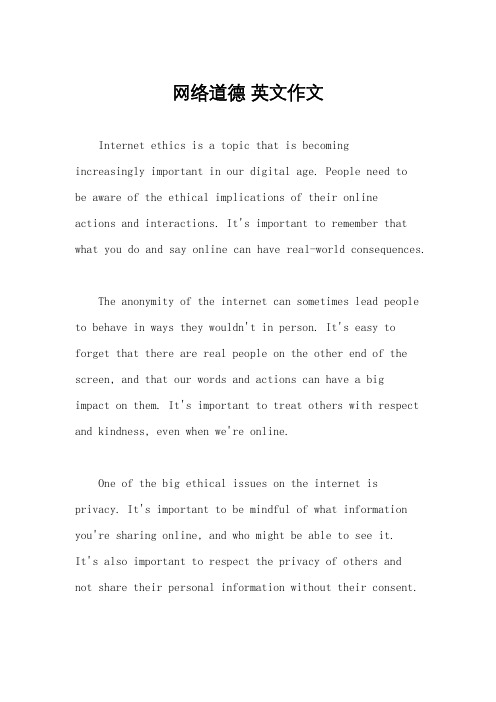
网络道德英文作文Internet ethics is a topic that is becomingincreasingly important in our digital age. People need tobe aware of the ethical implications of their onlineactions and interactions. It's important to remember that what you do and say online can have real-world consequences.The anonymity of the internet can sometimes lead people to behave in ways they wouldn't in person. It's easy to forget that there are real people on the other end of the screen, and that our words and actions can have a bigimpact on them. It's important to treat others with respect and kindness, even when we're online.One of the big ethical issues on the internet is privacy. It's important to be mindful of what information you're sharing online, and who might be able to see it.It's also important to respect the privacy of others andnot share their personal information without their consent.Another important aspect of internet ethics is the spread of misinformation. With so much informationavailable online, it's easy for false information to spread quickly. It's important to fact-check before sharing information, and to be mindful of the potential impact of spreading false information.Cyberbullying is another big issue when it comes to internet ethics. It's important to remember that our words and actions online can have a big impact on others. It's never okay to use the internet as a tool to hurt or harass others.Finally, it's important to be mindful of the impact of our online actions on the environment. The internet has a big carbon footprint, and it's important to be mindful of our energy usage and the environmental impact of our online activities.。
网络礼仪的英语作文
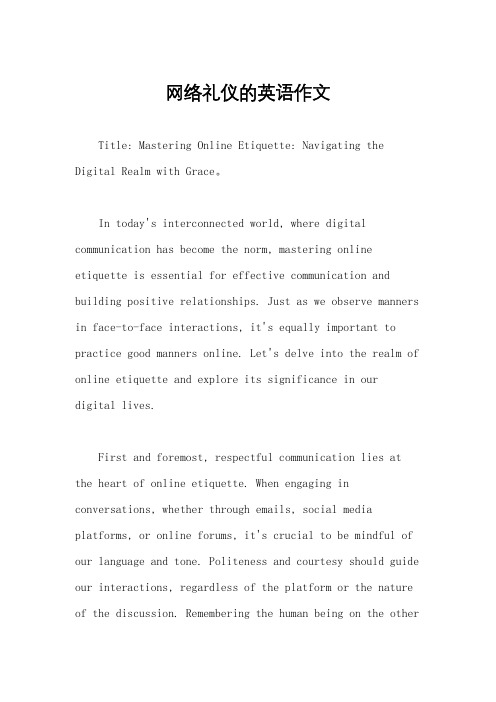
网络礼仪的英语作文Title: Mastering Online Etiquette: Navigating the Digital Realm with Grace。
In today's interconnected world, where digital communication has become the norm, mastering online etiquette is essential for effective communication and building positive relationships. Just as we observe manners in face-to-face interactions, it's equally important to practice good manners online. Let's delve into the realm of online etiquette and explore its significance in ourdigital lives.First and foremost, respectful communication lies at the heart of online etiquette. When engaging in conversations, whether through emails, social media platforms, or online forums, it's crucial to be mindful of our language and tone. Politeness and courtesy should guide our interactions, regardless of the platform or the nature of the discussion. Remembering the human being on the otherside of the screen can help foster empathy and understanding.Furthermore, maintaining professionalism in online communication is paramount, especially in professional settings such as emails or work-related chats. Proper grammar, punctuation, and spelling demonstrate attention to detail and respect for the recipient. Additionally, refraining from using jargon or slang that may not be universally understood ensures clarity and effectiveness in communication.In the realm of social media, where sharing thoughts and opinions is commonplace, exercising discretion and thoughtfulness is key. Before posting or commenting, consider the potential impact of your words on others. Respect diverse perspectives and engage in constructive dialogue, avoiding hostile or inflammatory language. Remember that once something is posted online, it can have a lasting presence and may be seen by a wide audience.Another aspect of online etiquette is respectingprivacy and boundaries. Before sharing someone else's content or personal information, obtain their consent whenever possible. Likewise, be mindful of the information you share about yourself, considering the potential implications of making personal details public. Respecting boundaries fosters trust and cultivates a positive online environment.Moreover, practicing good netiquette extends to digital spaces such as online gaming communities and discussion forums. Treat fellow participants with respect and refrain from engaging in disruptive or offensive behavior. Remember that behind every username is a real person deserving of courtesy and consideration.In addition to interpersonal etiquette, being mindful of digital citizenship is essential in navigating the online landscape responsibly. This entails being aware of the impact of our online actions on others and on the digital ecosystem as a whole. Avoid spreading misinformation or engaging in cyberbullying, and strive to contribute positively to online communities.As our digital interactions continue to evolve, so too must our understanding of online etiquette. By upholding principles of respect, professionalism, and responsibility in our online interactions, we can contribute to a more harmonious and inclusive digital society.In conclusion, mastering online etiquette is essential for navigating the digital realm with grace and integrity. By practicing respectful communication, maintaining professionalism, respecting privacy and boundaries, and embodying digital citizenship, we can foster positive online interactions and contribute to a more connected and compassionate digital world. Let us embrace the principles of online etiquette as we journey through the vast landscape of the internet, enriching our virtual interactions and relationships along the way.。
关于网络伦理的作文
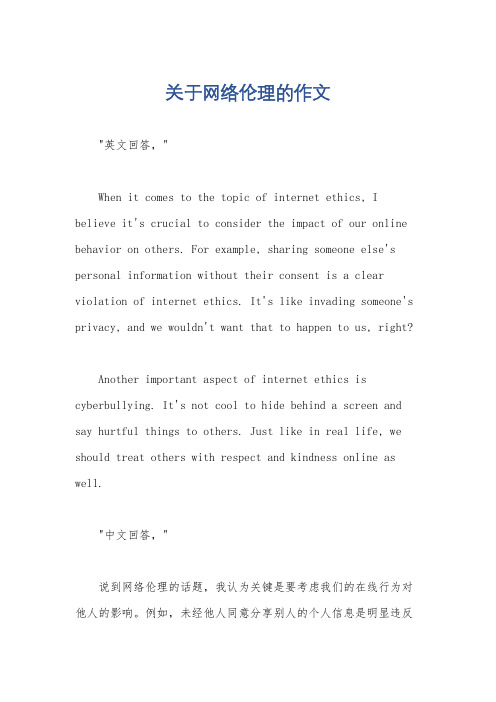
关于网络伦理的作文"英文回答,"When it comes to the topic of internet ethics, I believe it's crucial to consider the impact of our online behavior on others. For example, sharing someone else's personal information without their consent is a clear violation of internet ethics. It's like invading someone's privacy, and we wouldn't want that to happen to us, right?Another important aspect of internet ethics is cyberbullying. It's not cool to hide behind a screen and say hurtful things to others. Just like in real life, we should treat others with respect and kindness online as well."中文回答,"说到网络伦理的话题,我认为关键是要考虑我们的在线行为对他人的影响。
例如,未经他人同意分享别人的个人信息是明显违反网络伦理的行为。
这就好像侵犯了别人的隐私,我们也不希望这种事发生在我们身上,对吧?网络伦理的另一个重要方面是网络欺凌。
在屏幕后面说伤人的话并不酷。
就像在现实生活中一样,我们也应该在网上尊重和善待他人。
如何杜绝网络不文明行为英语作文

如何杜绝网络不文明行为英语作文How to Stop Uncivil Behavior OnlineThe internet is amazing! With just a few taps on a keyboard or phone, I can explore the entire world from my bedroom. I can learn about dinosaurs, play games with friends across the country, and watch hilarious videos of dogs and cats being silly. The internet is full of awesome stuff!But there's a problem online that bugs me - people being mean and rude to each other. You've probably seen it before - kids leaving nasty comments on videos or sending hurtful messages in game chats. Some jerks even make fun of others for things they can't control like their looks or disabilities. That's called cyberbullying and it's NOT cool at all.Cyberbullying makes the internet an unfriendly, toxic place that's no fun for anyone. It hurts people's feelings and damages their self-confidence. Some kids have even become depressed or had thoughts of hurting themselves because of cruel online bullying. That's really scary and sad! Nobody should have to go through that.So what can we do to stop this uncivil, bullying behavior on the internet? Well, I have some ideas that could help:Be an Upstander, Not a BystanderIf you see someone being bullied online, don't just watch and do nothing. Speak up and tell the bully to stop it! Report any harassment to parents, teachers, or website moderators. Bullies keep bullying when nobody stops them.Think Before You CommentBefore posting something on the internet, pause and think: "Would I say this to someone's face? Is it kind and respectful?" If not, don't post it! The golden rule is to treat others how you want to be treated yourself, online and off.Block and Ignore TrollsSometimes you'll encounter internet "trolls" who are just looking to get a nasty reaction out of you. Don't take their bait! Block or mute them instead of engaging. They'll get bored and go away eventually if you ignore them.Call Out Cyberbullying When You See ItIf a friend or someone you know is cyberbullying, tell them it's not okay. Explain how it can really hurt people and that there are better ways to treat others. We all need to look out for each other!Be Mindful OnlineIt's easy to forget there are real humans behind every username or avatar online. But there are! Choose to be caring and compassionate when interacting online, just like you (hopefully!) are in-person.Spread Positivity!The best way to fight against online negativity? Kill it with kindness! Leave supportive comments on posts you enjoy. Start a compliments hashtag. Send a friendly message to cheer someone up. Positivity is contagious too!Take Breaks When NeededIf you're feeling angry, sad, or getting too negative online, log off for awhile. Go outside, read a book, play with your pet - anything to reset your mind and emotions. Sometimes we all need a break from the digital world.Talk to Trusted AdultsIf you're being bullied or harassed online to the point where it's impacting your life, talk to a parent, teacher, counselor, or other trusted adult immediately. They can help put a stop to it and get you the support you need.Online bullying and rudeness won't disappear overnight, but we all have the power to make the internet a kinder, more decent place. It starts with each of us choosing to be respectful to others and calling out bad behavior when we see it. If we all work together on this, we can turn the tide against cyberbullying!I love all the awesome stuff the internet has to offer - let's make sure it stays fun and welcoming for everyone! Be a force for kindness and positivity online. A little respect and compassion go a long, long way in making the digital world a cooler place. We've got this!。
信息时代的道德观念英语作文范文
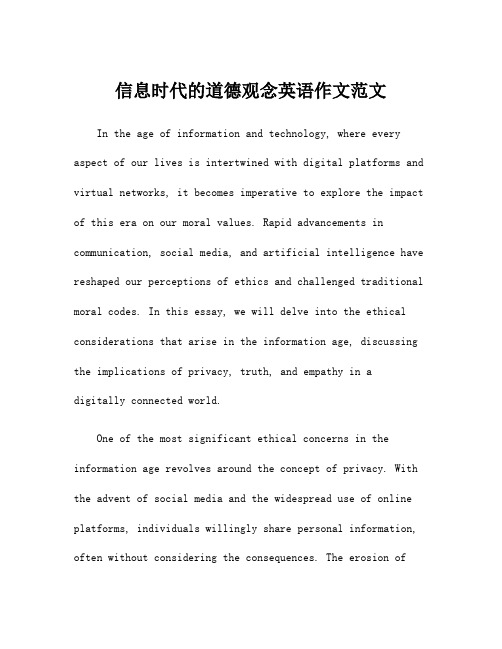
信息时代的道德观念英语作文范文In the age of information and technology, where every aspect of our lives is intertwined with digital platforms and virtual networks, it becomes imperative to explore the impact of this era on our moral values. Rapid advancements in communication, social media, and artificial intelligence have reshaped our perceptions of ethics and challenged traditional moral codes. In this essay, we will delve into the ethical considerations that arise in the information age, discussing the implications of privacy, truth, and empathy in adigitally connected world.One of the most significant ethical concerns in the information age revolves around the concept of privacy. With the advent of social media and the widespread use of online platforms, individuals willingly share personal information, often without considering the consequences. The erosion ofprivacy has given rise to debates over the ethical responsibilities of governments, corporations, andindividuals themselves. While it is essential to strike a balance between transparency and personal privacy, the unrestricted collection and misuse of personal data have become a prominent issue. Society must grapple with questions about who owns personal information, how it is handled, and what safeguards can be put in place to protect individuals from exploitation.Another moral consideration in the information age is the concept of truth. In this era of "fake news" and misinformation, distinguishing truth from falsehoods has become increasingly challenging. The ease with which information spreads through online platforms has led to the proliferation of rumors, propaganda, and manipulated content. The ethical responsibility lies not only with individuals to verify the accuracy of information but also with technology companies and media organizations to ensure the disseminationof reliable and unbiased content. Society must fostercritical thinking skills and promote media literacy to combat the spread of misinformation and preserve truth as a core value.The advancement of technology and the prevalence of virtual interactions have also led to a decrease in empathy and genuine human connection. Social media, while intended to connect individuals, often fosters a sense of superficiality and detachment. The absence of face-to-face communication and the ability to easily hide behind screens have diminished empathy and compassion. Cyberbullying, online harassment, and instances of trolling have become commonplace, highlighting the need to reassess our moral obligations in the digital realm. In this rapidly evolving landscape, it is essential to prioritize kindness, empathy, and understanding to build a harmonious online community.As with any period of rapid change, the information age brings both opportunities and challenges. It is our responsibility to navigate this era ethically and preserve fundamental moral values. Respecting privacy, upholding truth, and fostering empathy are essential pillars upon which the digital society should be built. Governments, educational institutions, and communities must work together to establish ethical frameworks, educate individuals about responsible digital behavior, and ensure that technology is harnessed for the collective benefit of humanity.In conclusion, the information age presents unique moral challenges that require careful consideration. Privacy, truth, and empathy are crucial elements that demand our attention in an increasingly interconnected world. By incorporating these values into our individual actions and societal structures,we can shape the digital landscape into a realm that upholds ethical principles while embracing the opportunities broughtby technological advancements.。
网络道德英文作文
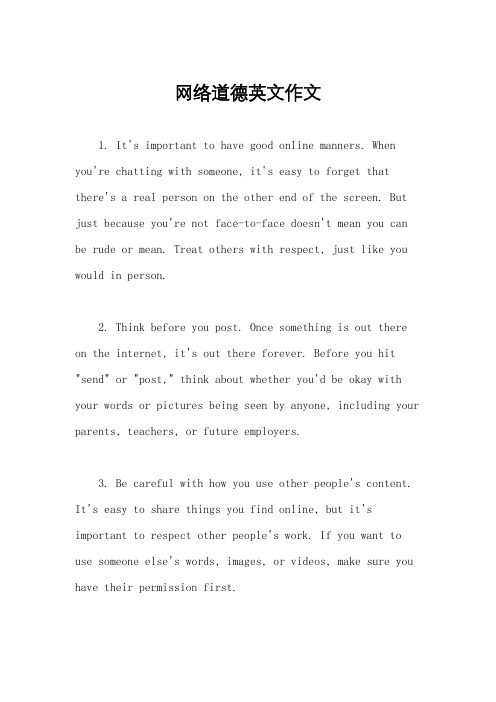
网络道德英文作文1. It's important to have good online manners. Whenyou're chatting with someone, it's easy to forget that there's a real person on the other end of the screen. But just because you're not face-to-face doesn't mean you can be rude or mean. Treat others with respect, just like you would in person.2. Think before you post. Once something is out there on the internet, it's out there forever. Before you hit "send" or "post," think about whether you'd be okay with your words or pictures being seen by anyone, including your parents, teachers, or future employers.3. Be careful with how you use other people's content. It's easy to share things you find online, but it's important to respect other people's work. If you want to use someone else's words, images, or videos, make sure you have their permission first.4. Don't spread rumors or gossip. It's easy to get caught up in the drama of social media, but spreading rumors or gossip can hurt people's feelings and damagetheir reputation. Before you share something, think about whether it's true, kind, and necessary.5. Protect your privacy. Be careful about sharing personal information online, like your full name, address, phone number, or school. Not everyone online has good intentions, so it's important to protect yourself from potential harm.6. Stand up to cyberbullying. If you see someone being bullied online, don't just stand by and watch. Speak up and support the person who's being targeted. And if you're the one being bullied, don't be afraid to ask for help from a trusted adult. Cyberbullying is never okay, and everyone deserves to feel safe and respected online.。
- 1、下载文档前请自行甄别文档内容的完整性,平台不提供额外的编辑、内容补充、找答案等附加服务。
- 2、"仅部分预览"的文档,不可在线预览部分如存在完整性等问题,可反馈申请退款(可完整预览的文档不适用该条件!)。
- 3、如文档侵犯您的权益,请联系客服反馈,我们会尽快为您处理(人工客服工作时间:9:00-18:30)。
On Improving Students’ Network Morality
As we all know, recently the problem of college students’ network morality is becoming serious gradually. We all can see that there are a lot of things, which are not health for our society. To our surprising, most of these things, like essays and photos, are put on the net by college students. Judging from that, we can learn how serious the problem is.
However, what is the damage about the problem? I think it may make those things, which are not health for our society, custom and morality, expanded fast and extensively. As the Internet has become popular, the information is expanding fluently. We all can acquire information from the Internet. If somebody puts something, which is not very moral, it maybe has a bad effect on the society. Those people who read it will be the victim possibly. In my opinion, it will damage the custom of our country.
It is the time to change it now. In order to improve students’network morality, we must make measures to strengthen the education about network morality. We
should let them know what they can do and what they can’t. After that, I believe the Internet will become wonderful.
You are required to write an article entitled “Marriage: Is it still a tradition?” with at least 120 words. The outline is given in Chinese.。
